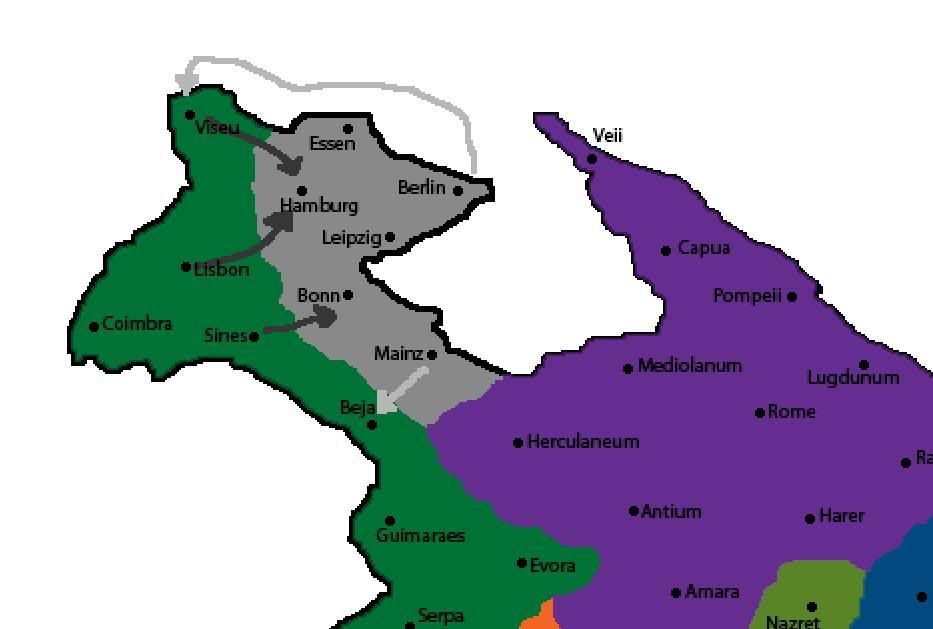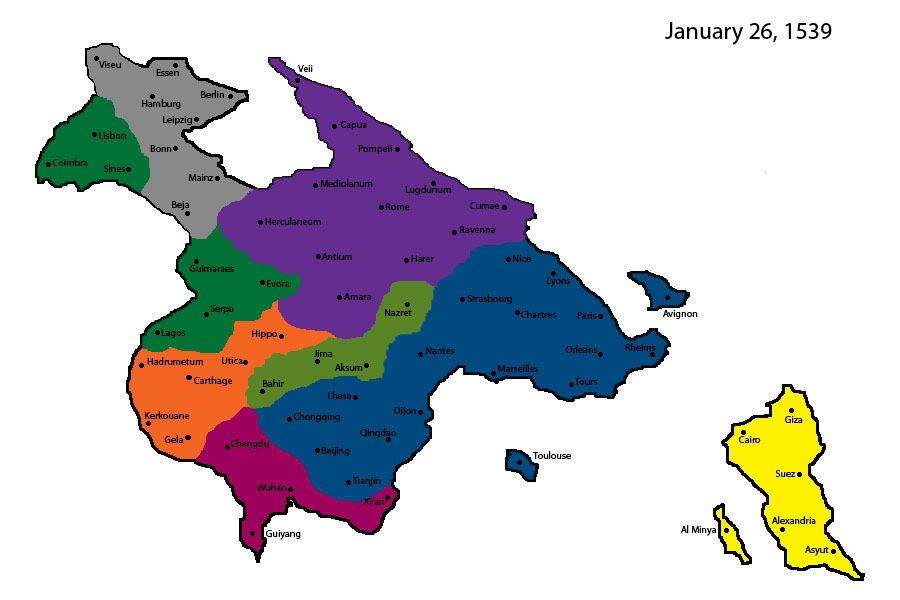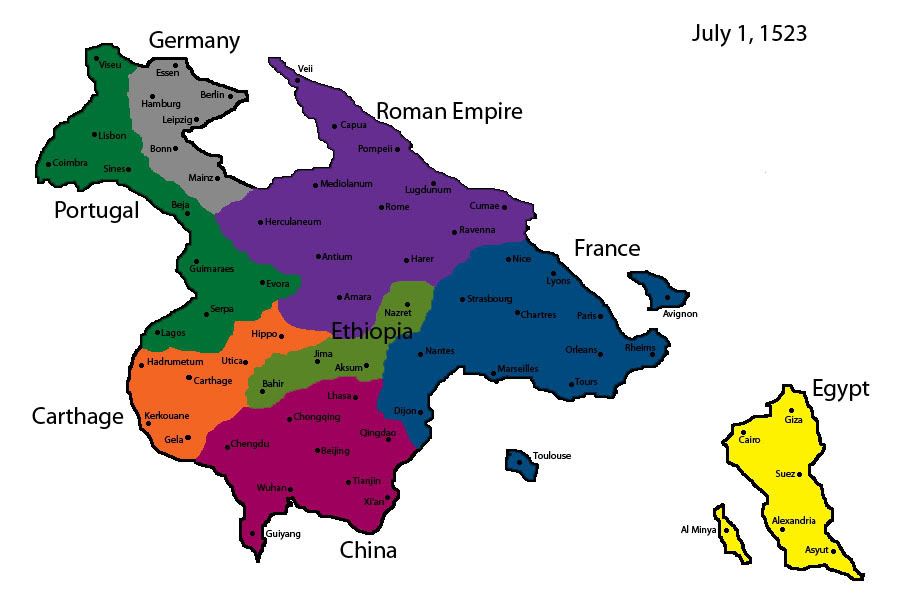
July 1, 1523
Dawn breaks on July 1st, and people around the world begin another normal day. History has been easy on the masses. At the dawn of civilization, 8 areas settled. Rome, Paris, Berlin, Cairo, Beijing, Carthage, Lisbon, and Aksum. These peoples settled to begin their Civilizations. Culture, Agriculture, Ideals, and Religion were the basis of the next 4000 years. Military Civilizations emerged, as well as peaceful. In 700AD, Rome had grown to the largest Civilization in the known world. Their armies were larger than their neighbors, and Leaders had their eye's on Empire... Roman Legions marched out of Antium and crossed the Ethiopian borders. Within a month, the Ethiopians surrendered two major cities, Amara and Harer, to the Roman Commander Heltastii.Ever since then, the Civilizations have grown and so have their militaries. This is where our story starts.
In the east, the large nation by the name of France, under the current leadership of King Napoleon, the political leaders had been considering taking military action on their western neighbor, China. The North-Eastern Chinese lands around the cities of Qingdao, Lhasa, and Chongqing, had vast deposits of Iron in the hills surrounding them. Napoleon met with his Military Adviser, Jacque of Orleans. The meeting lasted long into the late hours of July 1st. The next morning, at noon, the French Monarch gave the order to his commanders to move West with their armies.
The army in Strasbourg mobilized and moved westward, as did the army stationed in Chartres. The two armies arrived at the Chinese border around 11pm, and crossed, thus causing the first war the continent had seen since the time of the Roman-Ethiopian war.
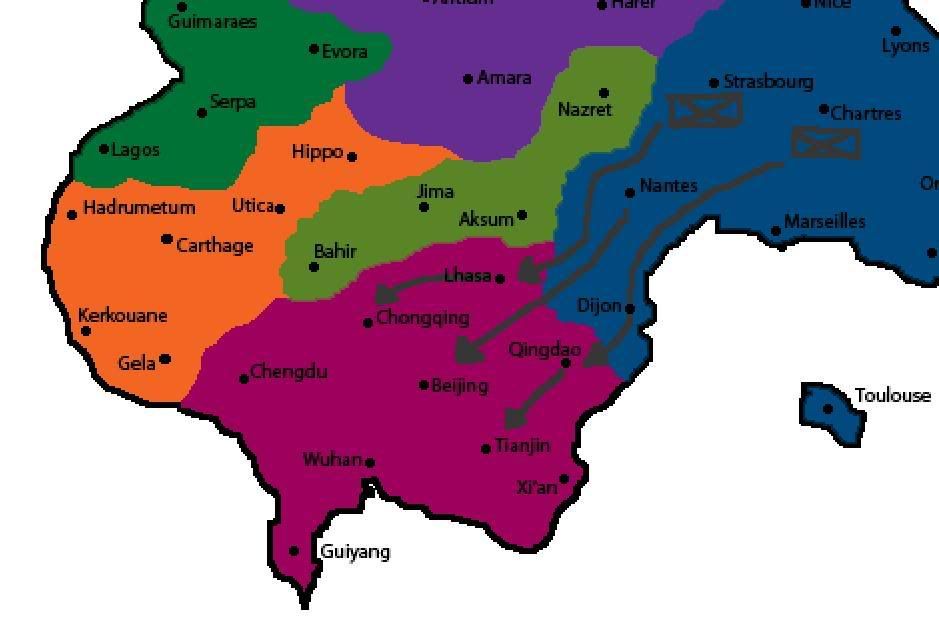
The Strasbourg Army moved quickly to lay siege to Lhasa. At the same time, The Chartres Army laid siege to Qingdao. There was a reward from the King himself to the Commander of the Army to topple the first Chinese City. The Army to receive this reward, was The Chartres Army. After 11 days of Siege, the Chinese decided to ride out and meet the attackers. The battle was quick and decisive, with French Longbowmen fortified on the hills, the Chinese force was severely weakened before charging the French infantry lines. The French flag was hoisted in the square of Qingdao on July 13, 1523. The siege of Lhasa was not as quick. After 2 weeks of bombardment, it seemed to Commander Charles of Orleans, that the Chinese wouldn't surrender easily. He sent a messenger from his camp en route to Nantes, to ask for reinforcements to be sent from Nantes to support his siege. Count Robert of Nantes accepted. He and his armies left Nantes on July 17 heading for Lhasa. But, to Commander Charles' surprise, two days after sending his messenger, the Chinese surrendered the city due to starvation. Upon hearing of the fall of Lhasa, Count Robert decided to continue marching his armies forward, and to assault the capital, Beijing. As Robert marched on, the Commander of The Army of Chartres, Commander Michelle de Chartres, rapidly assaulted Tianjin. The city had no walls, so one day after arriving 6 miles from the city, and setting up camp, the French army attacked. The mass of the French infantry marched on the north eastern side of the city. The Chinese quickly took defensive positioning facing the French. But not realizing that earlier that morning, French Knights had marched around the city behind the hills, until reaching the North-western point of the city. Within minutes of the Infantry engagement, the Knights quickly routed the Chinese, and took the city. The Chinese realized, defeat was imminent. They retreated their armies from Chongqing to Beijing, and armed the civilians with spears to meet the French. Count Robert set up camp 2 miles from Beijing, atop a large hill, on September 10. He sent a messenger to King Qin Shi Huang, with an ultimatum of unconditional surrender of the city of Beijing, 600 Hostages, and the removal of all Chinese forces from the surrounding area. If the King did not accept, Robert promised that Beijing will fall, and the French armies would not stop there. They would then march West and conquer the remaining Chinese lands. King Qin Shi Huang had 3 days to reply... He accepted.
The French conquest of China was complete on September 13, 1523. China surrendered Beijing, and moved the King to his new palace in the new capital of Guiyang. Borders were redrawn at a meeting between the two Monarchs in Beijing on September 27.
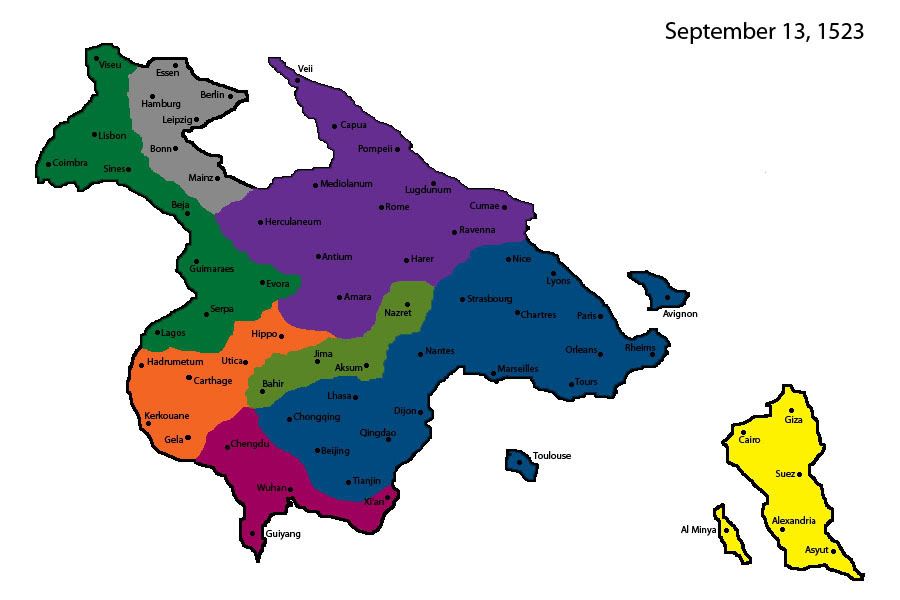
Conclusion of Post #1
To be Continued...

 great work and nice maps you have done, hope we see more soon!
great work and nice maps you have done, hope we see more soon!